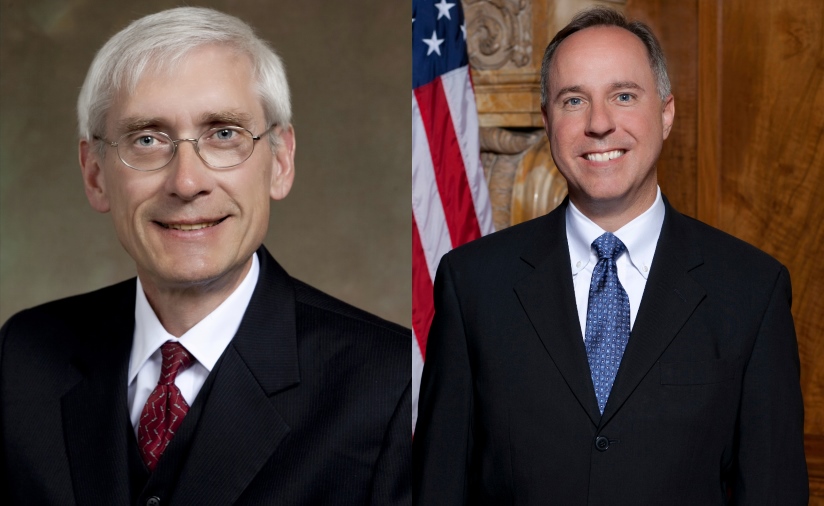Who Will Win State Budget Battle?
Right now it looks like an endless standoff. But appearances can be deceiving.
On the face of it, there’s little reason to think a compromise can be reached on anything in the state Capitol. On the one side we have a tough-minded conservative Republican Legislature used to getting their own way for eight years. On the other a liberal Democratic governor whose supporters are dying to do battle with the GOP after what seems like forever in the wilderness. So how can a budget that pleases both sides be crafted?
“All of the lobbyists and political observers in the Capitol are asking the same question and nobody knows how it will turn out,” says Curt Witynski, Deputy Executive Director and lobbyist for the League of Wisconsin Municipalities.
“Right now it looks like a standoff,” says another veteran lobbyist.
Viewed from the Republican side, Gov. Tony Evers waved a red flag by including many liberal proposals in his budget that he knew Assembly Speaker Robin Vos and Senate Majority Leader Scott Fitzgerald would choke on. “It is chock full of stuff I wouldn’t have expected,” says a Republican-leaning lobbyist. “It is setting a tone and that is a very stern tone.”
Republicans are already warning they will simply set aside Evers budget and start all over. “I didn’t think that was possible, now I’m not so sure,” says a veteran lobbyist.
And Evers has warned he would consider vetoing the entire budget. Which might not bother Republicans, because the state would continue spending money under the current budget.
“The GOP legislators would claim to be happy to keep Scott Walker‘s last budget in place indefinitely,” says former Democratic legislator Mordecai Lee.
All of which has some predicting the budget, due by July 1, could be delayed into October or even November, beating any past records for tardiness. But there are reasons to doubt this.
For starters, there’s nothing that ominous about Evers creating a budget to get as much as possible. It allows him to tell supporters he tried, but Republicans shot it down, and gives Democratic challengers issues to run on against GOP challengers. But it doesn’t mean the governor will hold out for all of this.
As for Republicans starting over on the budget, “they don’t necessarily have to work off Evers budget,” as PR man and former Republican legislative aide Craig Peterson notes. “The media will make it a big deal,” he adds, but Republicans will simply take the fastest route to where they want to go, which might mean using some of the governor’s budget language.
As for Evers deciding to veto the entire budget, he’s already begun to make statements discounting that option. And for good reason; it’s not the strategic way to go.
“Why do that,” says lobbyist Scott Jensen, who served as both the Assembly Speaker and chief of staff for Gov. Tommy Thompson. “Why would you give away any wins?”
The Republicans, he notes, are likely to support more funding for the schools and perhaps the roads, and programs for the homeless and opioid treatment. If you veto the entire budget, there’s no guarantee you get those wins in a future negotiation. Better to approve the budget provisions you like, and use the governor’s partial veto power — considered the strongest in the nation — to purge every item you oppose.
It takes a two-thirds vote of both houses of the Legislature to override any vetos and the Republicans lack enough votes to do it in either house. In the Senate they would need to flip four Democratic senators, which no one expects to happen.
As Jensen recalls when Thompson was governor but Democrats controlled the legislature, “as the minority in the legislature our greatest power was to hold the line on every veto.”
And while Evers’ partial veto power allows him to craft new sentences, reduce funding and make other creative changes, Jensen says Republicans must limit that by writing a minimalist budget. “Don’t do a budget with a lot of words. Don’t give the governor a word salad,” he warns.
Jensen was the chief of staff when Thompson set a state record with 290 partial vetos. As a joke Jensen had a staff contest (prize: a case of beer) to create the best new legislation using the partial veto. The winner took a Democratic measure to transfer the division of consumer protection to a different state department and changed it to moving the furniture out of then-Democratic Attorney General Jim Doyle’s office to a different state department.
In short, the partial veto is a powerful tool: a state Supreme Court decision described it as “quasi-legislative,” while Democratic Gov. Patrick Lucey once called the governor the “chief legislator.” Evers will want to use it to obliterate any stuff he opposes, and once the vetoes are upheld, look to negotiate. GOP legislators will want to get back things he vetoed, while Evers will want some of his original budget items restored — which sets the stage for a possible compromise.
As for the idea that Republicans would hold out for everything with the idea that they could just continue with the Walker budget, Lee doubts that will happen. “I think that’s just positioning.”
The reality is that all legislators, of both parties, will be hearing from schools and local governments in their district, that need to plan their budgets and need finality on how much in state aid they will get. There will be enormous pressure to end a long standoff, including from voters in both parties who are likely to get impatient and demand action.
The logic of the counter-veiling power here suggests a budget that is less ambitious, that gives each side the minimum they want. Republicans seem convinced Evers will get less because he can only veto items and can’t write legislation. “My guess is you will see a budget passed with most, but not all, of Evers’ stuff stripped out,” says a lobbyist.
But the governor clearly intends to appeal to the voters, and travel the state pushing for his most popular programs. And that may be the factor that is most unpredictable; if he can bring some public pressure on legislators, maybe that pushes the budget further his way. It’s only early March, which gives the governor six months to sell his budget and still avoid the record for the longest delay in state budget history.
I’m betting we get a new budget by October 1, with both sides claiming victory.
More about the 2019-2021 Wisconsin Budget
- State Budget Fell Short on Highways? - Laurel White - Jul 8th, 2019
- Rep. LaKeshia Myers Supports Governor Evers’ Partial Vetoes - State Rep. LaKeshia Myers - Jul 3rd, 2019
- Statement: Wisconsin’s biennial budget will speed up transition to electric vehicles and improve public transit - WISPIRG Foundation - Jul 3rd, 2019
- Majority Leader Fitzgerald Reacts to Governor Evers Signing the Wisconsin Budget - U.S. Rep. Scott Fitzgerald - Jul 3rd, 2019
- Evers Uses 78 Partial Vetoes on Budget - Laurel White - Jul 3rd, 2019
- Rep. Bowen Statement on Gov. Evers’ Signing of Biennial Budget - State Rep. David Bowen - Jul 3rd, 2019
- Promises Made, Promises Kept: Gov. Evers Signs Wisconsin’s 2019-21 Biennial Budget into Law - Gov. Tony Evers - Jul 3rd, 2019
- Budget Bill The Shortest in Decades - Shawn Johnson - Jun 30th, 2019
- Op Ed: Budget Should Plan For the Future - State Sen. Jennifer Shilling - Jun 29th, 2019
- Majority Leader Fitzgerald Statement on the Passage of the Wisconsin Budget - U.S. Rep. Scott Fitzgerald - Jun 26th, 2019
Read more about 2019-2021 Wisconsin Budget here
Murphy's Law
-
Top Health Care Exec Paid $25.7 Million
 Dec 16th, 2025 by Bruce Murphy
Dec 16th, 2025 by Bruce Murphy
-
Milwaukee Mayor’s Power in Decline?
 Dec 10th, 2025 by Bruce Murphy
Dec 10th, 2025 by Bruce Murphy
-
Total Cost of Foxconn Is Rising
 Dec 8th, 2025 by Bruce Murphy
Dec 8th, 2025 by Bruce Murphy






















